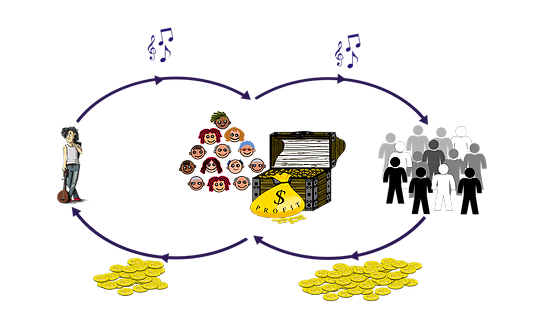Blockchain was originally built to power the cryptocurrency Bitcoin. As time passes, many realize the potential of this technology beyond the finance sector.
One of which was IBM, which partnered with ASCAP, SACEM and PRS For Music to adopt blockchain technology in music distribution.
They jointly develop a blockchain-based system with the aim to manage the links between music recordings International Standard Recording Codes (ISRCs), and music work International Standard Work Codes (ISWCs)
According to a press release:

With the internet, the music industry has evolved into something more global, allowing music to be distributed all around the world, without boundaries and with less to no initial costs. But those come with disadvantages.
Previously, music was sold on physical records, placed in stores for buyers to buy. With the internet, most notably after Napster, which was followed by Spotify, Apple Music, SoundCloud and more, music is ready to everyone's ears with a few clicks/taps.
In theory, listeners have to just pay a fee to access and listen to the music they like, to then make the streaming services pass the money to the artist. But in practice, things are much more difficult.
Copyright holders, like music labels, producers, musicians, vocalists, etc., are all having their share of the revenue generated by those online services. The problem here, those streaming services can experience difficulties in dealing with whom to pay, and by how much.
Depending on metadata which accompanies tracks, streaming services should be able to know how are the rights holders of a song, and how many times it has been played.
However, this data is often incomplete, can be easily stripped away.
With those streaming services are also looking for money, as a result, streaming and revenue-sharing deals that are so important for the industry, have become opaque and complicated.
This is where blockchain can play its role.
Smart contract on blockchain, can include which percentage of the revenue goes to which member of the band, the label, the manager, etc. It can even give a quick way of contacting all the involved rights holders for licensing queries.
Using IBM's open-source blockchain technology, ASCAP, SACEM and PRS For Music match, aggregate and qualify existing links between ISRCs and ISWCs in order to confirm correct ownership information and conflicts.
With blockchain that is characterized with transparency without centralized governance, the move marks how the music industry starts to leverage more modern technologies to benefit both the listeners and the musicians involved with their creations.

According to Elizabeth Matthews, CEO of ASCAP:
“Blockchain has become well-known for its use in payments systems because of its ability to capture real-time data and transaction updates that can be shared with multiple parties, and in the process, dramatically improve operations by reducing costs."
"ASCAP is excited to partner with SACEM and PRS on this project on behalf of our members.”
According to Jean-Noël Tronc, CEO of SACEM:
“Through this partnership, we aim to develop new blockchain-based technologies that will tackle a long-standing issue with music industry metadata – a problem that has grown more acute as online music rights distribution has become increasingly decentralized with the rise in digital channels. By developing this blockchain technology in partnership with ASCAP and PRS for Music, we will unlock value to the benefit of music creators worldwide.”
And according to Robert Ashcroft, CEO of PRS for Music:
"Blockchain and distributed ledger technologies are opening up a world of new opportunities for all industries to address long-standing challenges. The digital market requires real-time reporting on behalf of multiple stakeholders across the world. If blockchain can help us achieve this, it will unlock opportunities for developers of new digital applications, increase accuracy of royalty payments and release value for rightsholders."
"We see huge opportunity for beneficial industry change and collaboration from this initiative."